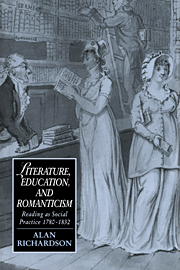2 - School time
Published online by Cambridge University Press: 08 February 2010
Summary
It is no accident that the authors of the eighteenth century's two most important educational treatises – Locke's Some Thoughts Concerning Education and Rousseau's Emile – were also the major political theorists of their age. The interrelation between political and educational discourses – the constitution of the state and the construction of its citizens – runs back at least to Plato's Republic, which Rousseau called “the most beautiful educational treatise ever written” (40). But during the modern era in Europe, with formal schooling less and less confined to an elite and with the informal spread of literacy among an increasingly mobile population, education and indeed childhood itself were politicized as never before. The ongoing debate on the uses and dangers of literacy and popular (if not yet mass) education became, during the later eighteenth century, what Raymond Williams has called the “central” issue in the “history of our culture.” With the notion of childhood increasingly defined in relation to schooling, theoretical and literary representations of childhood, including Romantic idealizations of the child, came inevitably to reflect and participate in the politics of literacy. As the educational base broadened, educational theory and practice became at once more “progressive” and more coercive, deeply implicated in what Jameson has termed the “collective reeducation of a whole population whose mentalities and habits were formed in the previous mode of production, feudalism or the ancien régime.”
Jameson's formulation cannot be adapted here without some qualification.
- Type
- Chapter
- Information
- Literature, Education, and RomanticismReading as Social Practice, 1780–1832, pp. 44 - 108Publisher: Cambridge University PressPrint publication year: 1994

